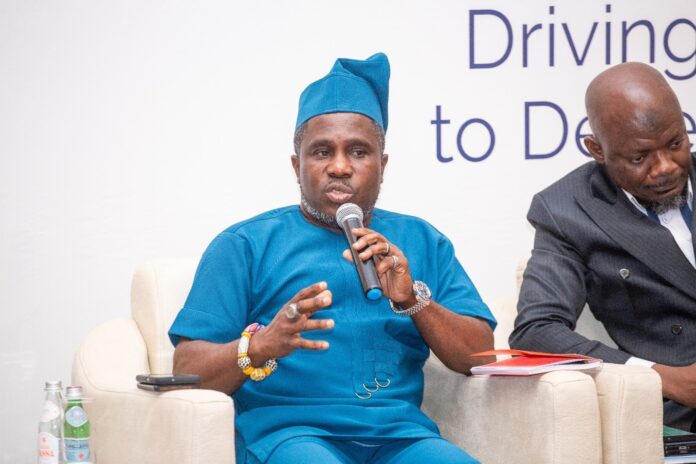
By Ebenezer Chike Adjei NJOKU
The Bulk Oil Storage and Transportation Company (BOST) is set to prioritise local content in a sweeping infrastructure expansion drive aimed at strengthening the nation’s downstream petroleum sector and positioning the country as a regional hub for fuel logistics.
Speaking on the sidelines of the Accra investor briefing session of ‘Invest in African Energy’ roadshow, Nana Amoasi VII, a Technical Advisor at BOST, outlined a pipeline of projects designed to modernise aging infrastructure, improve efficiency in product transportation, and enhance the country’s capacity to hold strategic fuel reserves. “BOST is set up to build pipeline and storage infrastructure or transportation and storage infrastructure. It is also mandated to hold strategic fuel stock for the country and also efficiently utilise this infrastructure,” he explained.
Nana Amoasi VII noted that over the past decade, no significant investments have been made to expand or improve BOST’s transportation and storage facilities. This stagnation, he said, has become untenable, especially in light of growing fuel demand and renewed interest from neighbouring countries in leveraging Ghana’s infrastructure. “We have received indications that other countries like Mali, Burkina Faso want to use the BOST infrastructure as a backbone to move products from the south all the way to the north or to the Sahelian markets,” he disclosed.
To meet this demand, BOST is rolling out a series of projects over the next few years. These include the doubling of its barge fleet operating on the Volta Lake between Akosombo and Buipe, expansion of the country’s aging pipeline network, and construction of a new storage terminal in Takoradi to serve the western corridor and beyond.
This includes the Buipe to Bolgatanga Petroleum Products Pipeline (B2P3), which Nana Amoasi VII described as central to BOST’s regional logistics ambitions. The 261-kilometre, 8-inch pipeline has a capacity of 8,800 cubic meters and will play a crucial role in delivering products to the Upper East and to the Sahelian region. “The fleet of barges or the vessels that run on the Volta Lake from Akosombo to Buipe must be doubled so that we can have a quick turnaround of movement of products,” Nana Amoasi VII said.
Currently, Ghana operates a single six-inch pipeline from Tema to Akosombo, installed in 1995. With the expected lifespan of such infrastructure ranging between 25 and 40 years, BOST is moving to both upgrade and expand capacity. The Tema-Akosombo Petroleum Pipeline (TAPP)—a 98.59-kilometre multi-product line carrying gasoline, gasoil, and kerosene currently has a capacity of 1,872.8 cubic meters. “We must also double the size of this pipeline. There are already some existing pipelines ready for construction which will also be laid in the next few years,” he noted.
Major local participation
A key focus of BOST’s strategy is to deepen local participation in the execution of these projects. Nana Amoasi VII said Ghanaian firms will be awarded exclusive contracts in several major areas, including pipeline construction and technical diagnostics. “The laying of the pipeline, the 12-inch pipeline from Tema to Akosombo will be dedicated solely to a Ghanaian company. A pigging of the line or intelligent testing of these lines will be dedicated partly to a Ghanaian company and a foreign company,” he added.
The energy expert said it forms part of broader national efforts to ensure that indigenous businesses benefit from large-scale public infrastructure investments. BOST is also inviting local private sector actors to invest in its growing logistics portfolio. “BOST owns some of the barges and wants to buy more and is ready to partner with private companies to also buy or procure these barges and operate,” Nana Amoasi VII stated.
Another component of the plan is the establishment of a dedicated strategic fuel stock facility capable of storing up to six weeks of national supply. This move is intended to shield the country from import disruptions and ensure energy security during supply chain crises.
“To keep the strategic fuel stock, we must have dedicated tanks for that, different from your normal market tanks,” Nana Amoasi VII explained. “Either the ‘Mami Water’ depot or a new depot has to be created so that it can keep almost six weeks of national supply in case of any damage to our receiving facility or any hiccups in the importation of products,” he further stated.
BOST’s proposed terminal in Takoradi will take advantage of the port’s deep-water jetty, offering a more efficient route for fuel imports and positioning Ghana to serve the Ivory Coast-Liberia corridor. “The facility in Takoradi will also allow us to bring in fuel for the country and supply Ivory Coast and Liberia,” he said.
While these initiatives will require significant investment, Nana Amoasi VII maintains that there is a clear opportunity for Ghanaian firms to take ownership of the country’s energy logistics value chain. “Ghanaian companies must be given the opportunity to also have a bite of every investment that we have in the petroleum downstream and also upstream,” he said.









